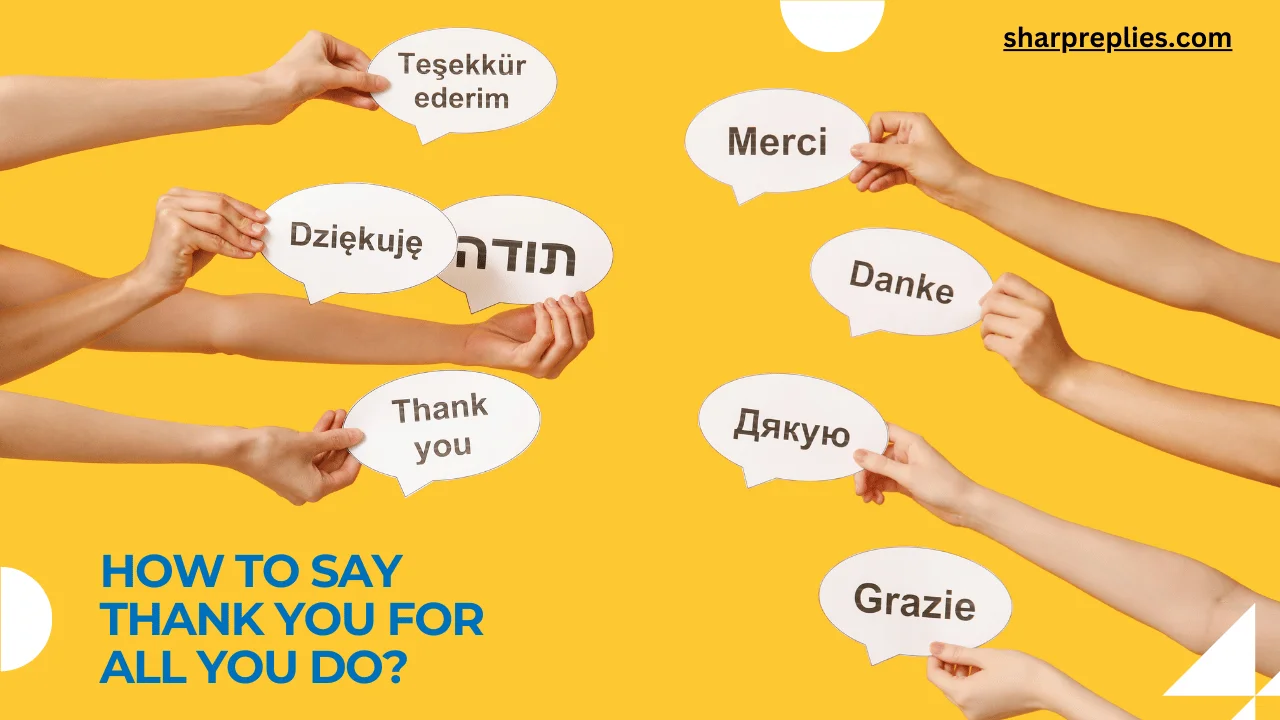Gratitude is one of the simplest yet most profound ways to express appreciation for others, especially when their actions go above and beyond expectations.
“Thank you for all you do” is more than just a phrase; it’s a reminder of the immense contributions people make in our lives, whether through kindness, support, or hard work. In a world that often moves too quickly, pausing to acknowledge the efforts of those around us is an act that can foster deeper connections and a sense of belonging.
But have you ever truly stopped to think about the significance of those words? In this article, we’ll explore the power of saying “thank you,” why it matters, and how recognizing the contributions of others can shape our relationships and communities.
By the end, you’ll discover that saying “thank you” is not only a gesture of appreciation but a powerful tool for strengthening bonds.
Contents
- 1 The Power of Appreciation and Gratitude
- 2 Saying “Thank You” in Different Contexts
- 3 The Benefits of Saying “Thank You”
- 4 The Impact of Gratitude on Relationships
- 5 Practical Ways to Show Appreciation
- 6 Conclusion
- 7 FAQ’s
- 7.0.1 Why is saying “thank you” so important?
- 7.0.2 Can saying “thank you” improve my relationships?
- 7.0.3 Is there a difference between “thank you” and “thanks”?
- 7.0.4 How can I express gratitude in the workplace?
- 7.0.5 What are some creative ways to show gratitude?
- 7.0.6 Can gratitude improve my mental health?
The Power of Appreciation and Gratitude
Gratitude is a universal language that transcends boundaries. When we say “thank you,” we are not just acknowledging someone’s effort; we are showing respect and recognition for their time, energy, and sacrifice.
Appreciation boosts the morale of both the giver and the receiver. When someone feels valued, they are more likely to continue offering their support, whether in the workplace, at home, or in the community. Gratitude also helps to create a cycle of kindness, inspiring others to pay it forward.
In relationships, expressing thanks for everyday actions can deepen the connection and make each person feel seen and heard. In fact, studies have shown that expressing gratitude regularly can lead to increased happiness and reduced stress levels.
It’s an essential practice for fostering positive environments, where people feel empowered to do more.
Saying “Thank You” in Different Contexts
The phrase “thank you for all you do” is not confined to one setting. Whether it’s in the workplace, at home, or in public, expressing appreciation can take many forms. In professional environments, managers who regularly thank their employees contribute to higher job satisfaction and productivity.
This small act creates a culture of trust and mutual respect, where employees feel valued. In families, showing gratitude for everyday actions, such as cooking dinner or taking care of household chores, can promote harmony and a sense of teamwork.
Similarly, in friendships and social relationships, expressing thanks for both big and small gestures strengthens bonds and deepens the sense of connection. No matter where or how it’s said, “thank you” has the power to uplift and inspire.
The Benefits of Saying “Thank You”
There is more to saying “thank you” than meets the eye. This simple phrase has been shown to improve mental health, increase empathy, and even contribute to physical well-being.
People who practice gratitude regularly experience lower levels of anxiety and depression, as focusing on the positive aspects of life shifts the brain’s attention from negative thoughts. Furthermore, gratitude strengthens relationships by fostering feelings of appreciation and warmth.
It encourages people to continue helping and supporting others, knowing their efforts are valued. In a broader sense, this ripple effect contributes to a healthier, more compassionate society, where individuals feel empowered to act with kindness and understanding.
The Impact of Gratitude on Relationships
In personal relationships, gratitude plays a pivotal role in maintaining emotional intimacy and mutual respect. When someone expresses thanks, it acknowledges the importance of the other person’s actions and contributions.
Over time, this helps to build trust and deepen bonds. For instance, in romantic relationships, expressing appreciation for a partner’s efforts creates a sense of emotional security, where both individuals feel valued and understood.
In friendships, it nurtures a supportive atmosphere where both people are eager to give and receive help. Simply put, gratitude is the glue that holds relationships together, preventing them from becoming stale or one-sided.
Practical Ways to Show Appreciation

Saying “thank you” doesn’t always have to be verbal. There are countless creative and meaningful ways to show appreciation. Writing heartfelt notes, giving small gifts, or taking the time to do something thoughtful for someone else can leave a lasting impact.
Acts of service, like helping a colleague with a project or lending a hand with household chores, are also powerful forms of gratitude. The key is to be sincere and genuine. When expressing thanks, it’s important to acknowledge the specific actions or efforts that made a difference.
This personal touch enhances the sincerity of the gesture and makes the recipient feel truly appreciated.
Conclusion
In a world where people often go unnoticed or unappreciated, taking the time to say “thank you for all you do” can be a game-changer. It has the power to strengthen relationships, improve mental well-being, and inspire more acts of kindness.
Gratitude is a simple but transformative tool that fosters connection, whether it’s in the workplace, at home, or in social settings. So, the next time you find yourself thinking of all the ways someone has helped you or made your life easier, take a moment to say those three powerful words: thank you.
By doing so, you not only acknowledge their effort but also contribute to a more positive and compassionate world.
FAQ’s
Why is saying “thank you” so important?
Saying “thank you” acknowledges the time, effort, and kindness someone has extended to you. It fosters positive relationships and promotes a sense of mutual respect and appreciation.
Can saying “thank you” improve my relationships?
Yes! Regularly expressing gratitude helps to strengthen emotional bonds, build trust, and create a more positive atmosphere in both personal and professional relationships.
Is there a difference between “thank you” and “thanks”?
While both convey appreciation, “thank you” tends to be more formal and sincere, often used for more meaningful gestures, while “thanks” can be casual or used in everyday situations.
How can I express gratitude in the workplace?
You can express gratitude by offering a heartfelt “thank you,” recognizing someone’s contributions in meetings, or writing a personal note of appreciation for their hard work.
What are some creative ways to show gratitude?
Some creative ways include writing handwritten notes, giving thoughtful gifts, or performing acts of service, such as helping someone with their tasks or chores.
Can gratitude improve my mental health?
Yes! Regularly practicing gratitude can reduce stress, increase happiness, and lower the risk of depression by shifting your focus toward the positive aspects of life.








